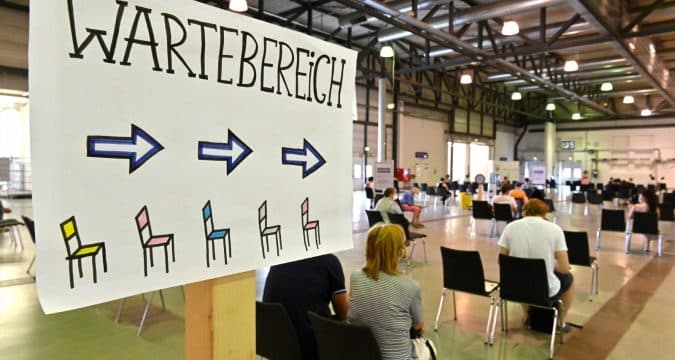
OXFORD (CNS): With the Covid-19 coronavirus [SARS-CoV-2] still taking a toll across Europe, Catholic bishops are backing vaccination campaigns, while also counselling against coercion.
In Germany, where the government of chancellor, Angela Merkel, has warned of tougher restrictions on those refusing jabs, Bishop Georg Bätzing, the president of the German Bishops’ Conference, said in late July that vaccination should be a personal choice, but he urged Catholics to get vaccinated to ensure that freedoms would not be withdrawn again if there was a new spike after the summer.
“I share the concerns of politicians—we will only defeat this virus if we all pull together,” Bishop Bätzing said in a statement.
“To be vaccinated means more protection and freedom not just for you, but for everyone in society. It therefore expresses solidarity and charity,” the bishop said.
On the German Church’s portal, Katholisch.de, there was a discussion on August 4 as to whether vaccinations should be compulsory for Mass attendance to make the Church a “moral pioneer.”
One website commentary said, “It would clearly signal the Church was standing behind science and advocating solidarity, as well as using her authority for something good and countering the many negative headlines and scandals,”
‘By making it compulsory for some and by imposing a health pass for certain activities, the government is fulfilling its legitimate responsibilities… It is imposing restrictions on those who refuse the vaccine’
It said, “Even with increasing infections, Church services could stay lively, with singing choirs, peace handshakes and a carefree reception of Communion.”
However, another commentary said excluding the non-vaccinated would be “incompatible with the Christian message.”
In neighbouring France, beginning on August 9, people wanting to participate in leisure activities or use public transportation will need proof of vaccination, a negative Covid-19 test or proof of recent recovery. Catholic bishops have backed compulsory vaccination for certain groups, despite widespread protests.
Archbishop Pierre d’Ornellas, who heads the French bishops’ bioethics group, said in an August 2 statement on its website that a “more tolerant approach” was needed for those with “legitimate hesitations and fears” about civil liberties
“The vaccination is a medical response for coping with an epidemic that risks further paralysing economic and social life,” the bishops’ conference said on July 22.
“By making it compulsory for some and by imposing a health pass for certain activities, the government is fulfilling its legitimate responsibilities… It is imposing restrictions on those who refuse the vaccine,” the conference said.
However, Archbishop Pierre d’Ornellas, who heads the French bishops’ bioethics group, said in an August 2 statement on its website that a “more tolerant approach” was needed for those with “legitimate hesitations and fears” about civil liberties.
Several European bishops have reprimanded clergy for questioning vaccination policies.
On August 3, the Diocese of Gurk-Klagenfurt in Austria, “resolutely” distanced itself from a priest in Preitenegg after he wrote parishioners and urged them to resist “the vaccine-mad criminal gang and its collaborators.”
In England, where bishops’ conference guidelines describe vaccines as “an important breakthrough in protecting others and oneself,” the Diocese of Portsmouth reprimanded Franciscan Father George Roth on August 4 for telling parishioners in an email that their lives could be endangered by vaccinations.
In a July 17 appeal, Archbishop Stanislaw Gadecki, president of the Polish Bishops’ Conference, said vaccinations offered hope “for the normal functioning of societies” and reminded Poles of their duty to consider “demands of the common good.”
Several diocesan bishops have since urged citizens to receive the jab, comparing it to mass tuberculosis inoculations after World War II. Some encouraged parishes to offer their premises for vaccination teams.
Proof of vaccination or a negative test were required for attending the August 1 to 6 annual International Youth Festival in Medjugorje, Bosnia-Herzegovina, and since July 18, have been required for entry to the ecumenical Taizé Community in France.
Proof of immunisation will be required for all events during the pope’s September 12 to 15 pilgrimage to Slovakia.
Pope Francis will stop en route to Slovakia for the closing of the International Eucharistic Congress in Hungary, which requires a proof of vaccine or a negative Covid-19 test.








